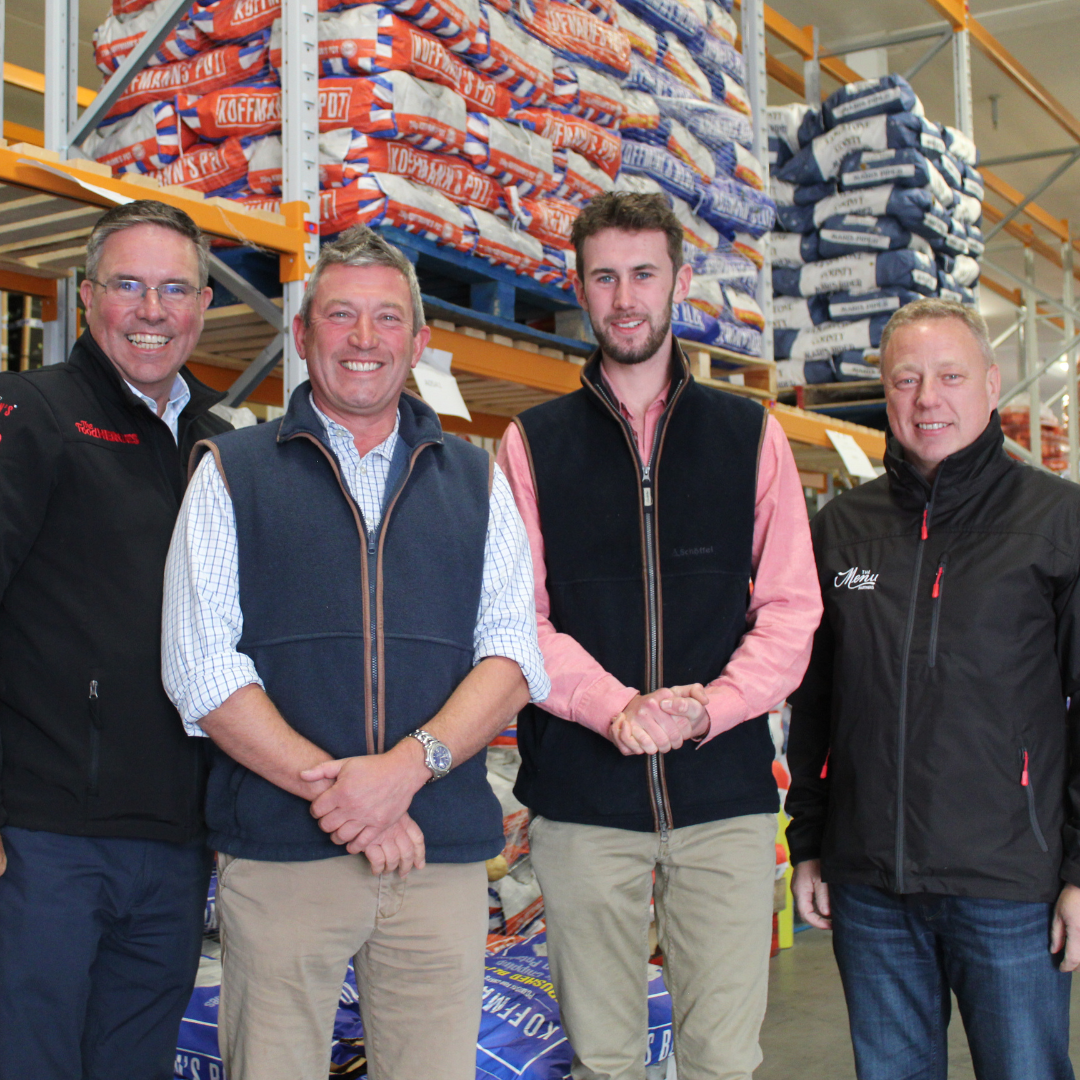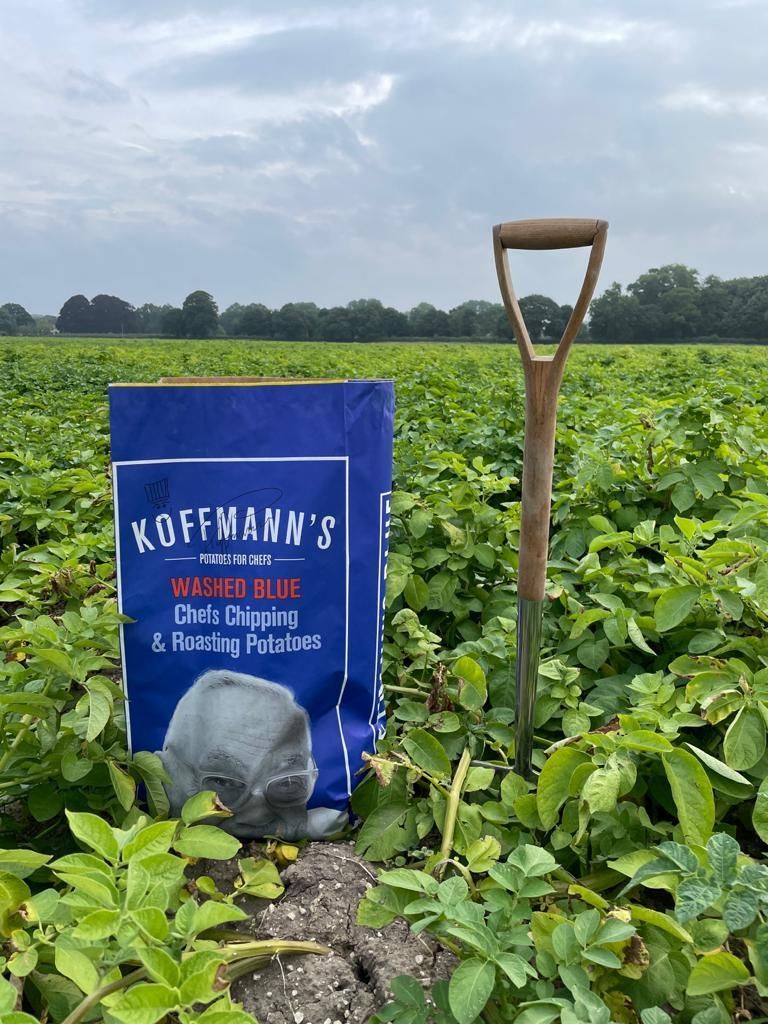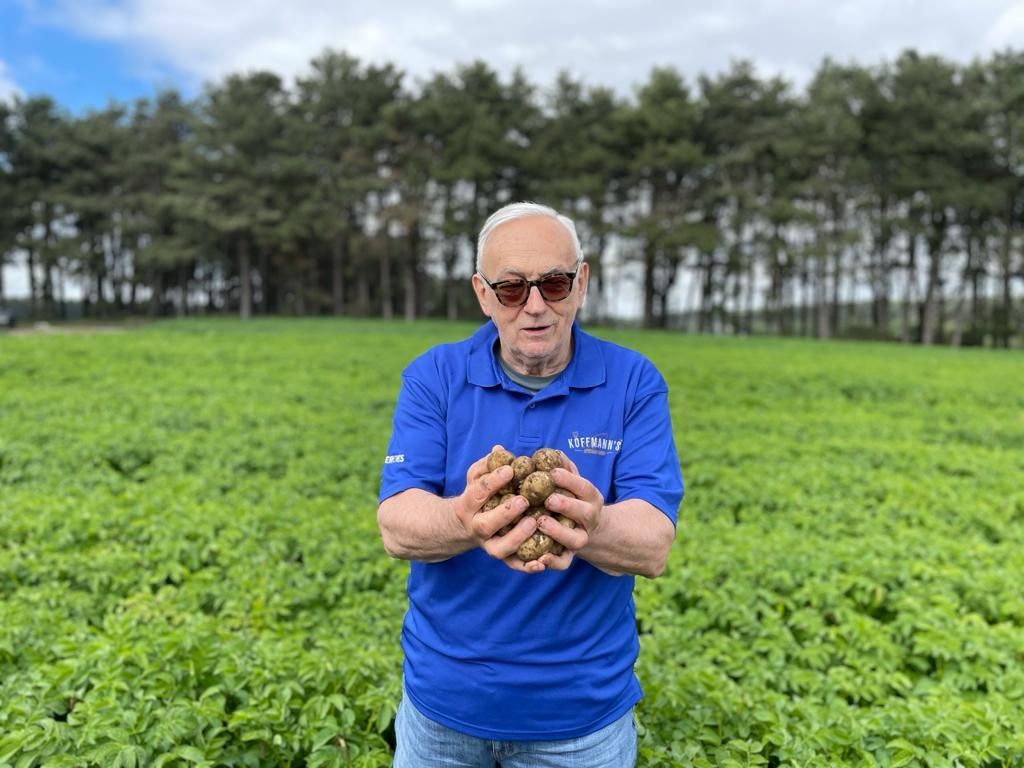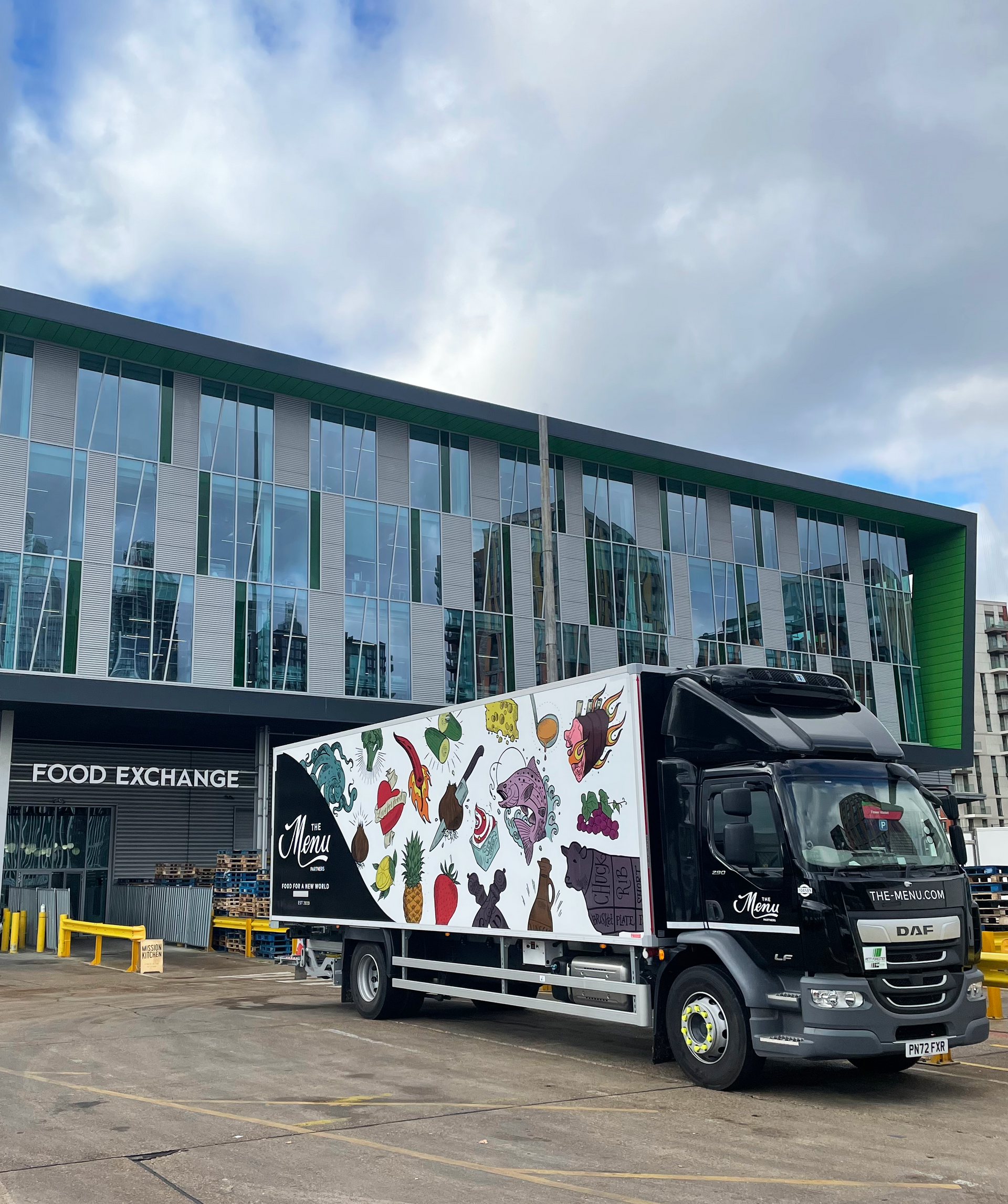When a Cornish potato grower visited a London wholesaler with their Lincolnshire marketing partner last week, we tagged along to find out what makes this very British supply chain relationship work so well.

Over the last couple of years, anyone who has spent any time in a British wholesale market, restaurant kitchens or independent retailers will almost certainly have spotted big blue bags of potatoes emblazoned with the smiling face of legendary chef Pierre Koffmann. What they perhaps wouldn’t realise though is that The Food Heroes (TFH), the Lincolnshire firm that markets both the Koffmann’s and Marco Pierre White fresh, processed and frozen potato brands, is also behind a growing stable of other British potato vegetables brands.
One of TFH’s key grower partnerships is with the exclusive grower of salad potato ‘Jazzy’ in the UK, The Little Spud Company, and during British Food Fortnight, TFH’s Farming Director Shaun Langley was at New Covent Garden Market in London with Jason Tanner, MD of The Menu Partners, and Jazzy growers father and son Phil and Harry Rogers, who run Pengelly Farms, in Helston, Cornwall.
Pengelly Farms Ltd is first to market with British grown salad potatoes, in early to mid-May each year. Since 2008, it has exclusively grown and marketed the Jazzy variety in the UK, predominantly in supermarkets, but for the last two years, the brand has been sold into the wholesale, catering and hospitality sectors around the country through its partnership with TFH.
The Menu Partners is also a close customer of TFH. The group includes Premier Foods Wholesale, which is one of The Food Heroes regional partners and is based at New Covent Garden Market. From that base in Nine Elms, on the south bank of the River Thames, it sells large volumes of the TFH brands of fresh and processed potatoes into its UK and international customer network and also exclusively distributes TFH frozen brands nationwide.
The Rogers family relationship with The Food Heroes is more friends reunited than a brand-new venture, as Phil had known Shaun and his fellow Directors Simon Martin and Claire Koffmann for years before they got reacquainted. “We first worked together around 30 years ago – we hadn’t lost touch, but when they came down to see me two years ago, we rekindled that relationship and decided the time was right to develop something new together,” says Phil.
“We trialled Jazzy when it was just a numbered variety almost 20 years ago and realised the potential it had. Its yields and hit rates are excellent – there are very few fails. And in terms of quality, it’s fantastic. We took the clamshell approach because we knew that if we let it be grown more widely, it would be detrimental to the brand. So, we applied for exclusivity.
Jazzy has quickly become an established year-round string to the TFH bow. Shaun says: “We have promoted the Jazzy brand through wholesale and put some proper structure behind that, which gives renewed identity to the variety. We’ve got another early variety in the pipeline for next season.”

Route to market
The venture has opened Phil’s eyes to a market he had largely ignored: “We’d found it difficult to find the right wholesale market partner, so we focused on retail,” he says, “but the wholesale and foodservice side of things have got very interesting and dynamic again – there’s so much potential. When you see the infrastructure that Jason has built in New Covent Garden Market and what he’s doing at that end of the chain, it just has to fill us with confidence.”
Phil’s father Simon began farming at Pengelly Barton in 1967, three years before Phil was born. A third generation of Rogers, Phil’s son Harry, is now in the business too. “With Harry coming in, we needed an injection of excitement and we’re all really looking forward to seeing where this will lead to. This relationship is giving smaller retailers and the whole catering industry access to top-quality product they wouldn’t have had before.”
The partnership between TFH and The Menu Partners and its wholesale arm Premier Foods Wholesale has also been mutually beneficial. “We’ve been working with Koffmann’s fresh and frozen products for three years now,” says Jason. “The frozen product has been distributed into the catering industry predominantly, while the fresh product has been sold to catering and also secondary wholesalers across the country.
“The TFH brands have become a big part of our business in a relatively short space of time,” he adds. “Initially, the Frozen and Fresh ranges predominantly included potatoes, carrots and parsnips, but new lines are being added on a regular basis - frozen Yorkshire peas and fresh English asparagus, for instance.
“It’s the service, the quality and the range that sets them apart for our customers and demand has grown quickly across the country. The fresh brands are very popular and the frozen brands have also been doing very well. Price does play its part, but I think the demand for frozen has being driven by the outstanding quality and consistency of the product we have to offer.

Stamp of approval
Shaun says the Koffmann stamp of approval has been crucial in building momentum behind the brands. “Because our brands are all built on quality and we’ve proved the consistency, they command a slightly higher price, which gives us the capacity to support our growers. Having Pierre with us has been huge – it’s one thing that we say the product is fantastic quality, but to have the endorsement of one of the country’s top chefs is a massive plus-point.”
Pierre adds his Michelin Starred chef’s eye and a vastly experienced understanding of culinary quality to proceedings. He’s heavily involved in the day-to-day operation, visiting growers, packhouses, customers, festivals etc… to constantly quality-check the product and get to know the supply chain and the people in it. “I look at it like a blue tick on Twitter (now X),” says Shaun. “If Pierre says it’s the best and he’d be happy with it, then that’s enough for me.”
TFH is a very hands-on, personal affair, which makes a real difference to Phil “That’s really, really important,” he says. “To have people like Pierre come down to see us in Cornwall is so rare. It feels like we’ve been welcomed into the family and it’s great that the people at the top are so involved with us. There’s a real energy and it feels like we’re all in this together, from the guy who plants the seeds, to the person who delivers the final product.”
That final person often hails from New Covent Garden Market, the country’s largest wholesale market, which is located in Nine Elms just south of the River Thames. The huge site is currently being redeveloped and The Menu Partners recently moved into extensive brand-new premises. A large part of the facilities is fully refrigerated and the firm has invested in state-of-the-art equipment both in its storage and handling depot and the offices above, which feature a magnificent development kitchen.
The Menu Partners also has sites in Brighton, Bicester, and Middleton, near Liverpool, but is firmly committed to its base. “The market is vital to what we do,” says Jason. “The reason we have invested so heavily in New Covent Garden Market is that this is the best place by far from which to serve London.”

Mutual gains
TFH’s market penetration has been swift and extensive and as the product range increases, so does the ambition, Shaun says. “In lots of kitchens, we can say we have 25% of the plate now and obviously we’re never going to be 100%. However, there’s no reason why we can’t aim to be 50% or more.
“The ethos has always been based on quality and consistency,” he adds. “No-one in this country is finding it easy at the moment and as part of the supply chain, we felt we had to find a way to make chefs’ lives easier and more predictable. Having product you can trust every time can make a big difference to your overheads.
“We never ask what’s in it for TFH. Last year was extremely tough for everyone in the British potato industry, for instance, and some people turned their backs on growers. We know loyalty matters and that this has to work for everyone. To be successful, we need a quality British grower base that shares our values and ambition and comes on the journey with us. Financially, it’s not about us and them; if we don’t both win then the whole thing fails.”
Share:
You may also be interested in...














